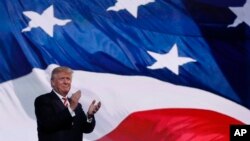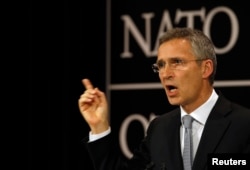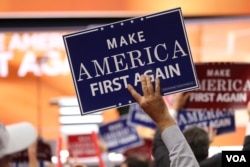U.S. Republican presidential nominee Donald Trump is questioning whether the United States would automatically defend other NATO allies if they were attacked, a bedrock principle of the U.S.-European military alliance since the end of World War II.
As he gets ready to address Americans Thursday night as the 2016 Republican presidential candidate, Trump told The New York Times that he, if elected, would set conditions on how the United States would respond to an attack on any of the other 27 NATO countries. Trump said he would first see if other countries have shared the cost of funding NATO defense expenses that the U.S. has largely borne but that he says can no longer afford.
NATO Secretary General Jens Stoltenberg immediately rebuffed Trump, saying, "Solidarity among allies is a key value for NATO."
Stoltenberg added: "We defend one another. We have seen this in Afghanistan, where tens of thousands of European, Canadian and partner nation troops have stood shoulder to shoulder with U.S. soldiers. Two world wars have shown that peace in Europe is also important for the security of the United States."
White House spokesman Josh Earnest said the United States has "a steadfast commitment to our NATO allies," which he described as "iron clad." He said there should be no mistake or miscalculation made about the U.S. commitment to the NATO alliance.
Fulfilling obligations?
Trump said he "would prefer to be able to continue" existing agreements. But asked whether the U.S. would defend three small Baltic states – Latvia, Lithuania and Estonia – from a Russian attack, Trump said he would decide whether U.S. assistance was warranted only after reviewing whether they "have fulfilled their obligations to us." The three nations have been NATO members since 2004.
He said, "If they fulfill their obligations to us, the answer is yes."
Estonian President Toomas Hendrik Ilves voiced his irritation at Trump's views, tweeting that Estonia is one of five NATO countries in Europe that is meeting its commitment to spend 2 percent of its budget on defense and that it had "fought, with no caveats" alongside NATO allies in Afghanistan.
The NATO involvement in Afghanistan, occurring after the September 11, 2001 terrorist attacks in the United States, is the only time the treaty's mutual defense clause has been invoked, warfare aimed at destroying al-Qaida's Afghan training operations.
Retired Lt. Gen. Michael Flynn, a Trump adviser who spoke on his behalf at this week's Republican National Convention, told VOA that too often NATO members want to have a military that mirrors that of the U.S., with an Army, Navy and Marine Corps, but that they cannot afford to do so and "are not paying for it now."
"It'll be a good relationship, one based on brutal honesty and based on mutual respect for each other's capabilities and understanding that all of the countries in NATO can't all try to look alike when talking about military resources and capabilities," Flynn said.
Shifting approach
Trump acknowledged that his approach to U.S. foreign affairs differs from past Republican presidential candidates, who since the end of World War II seven decades ago have supported an internationalist agenda, in which the U.S. views itself as the dominant force in the world for peace.
He said he would press his theme of "America First," which he said meant to him that "we are going to take care of this country first before we worry about everyone else in the world."
'Fix our own mess'
Trump said the United States has to "fix our own mess" first before trying to alter other countries' behavior, such as not pressuring Turkey in the wake of last week's failed coup, or other authoritarian allies, as they purge political opponents or crack down on civil liberties.
"I don't think we have a right to lecture," Trump said. "Look at what is happening in our country. How are we going to lecture when people are shooting policemen in cold blood?"
Asked whether the U.S. should urge Turkish President Recep Tayyip Erdogan to observe Western standards of justice in dealing with opponents of his government in the aftermath of the putsch, Trump demurred.
"When the world sees how bad the United States is and we start talking about civil liberties, I don't think we are a very good messenger," he said.
Trump defined U.S. interests abroad almost entirely in terms of economic interests.
"We are spending a fortune on military in order to lose $800 billion," Trump said, in a reference to what he claimed are U.S. trade deficits. Last year, the figure was actually $531.5 billion.
Trump further pledged to scrap the North American Free Trade Agreement with Canada and Mexico unless they negotiate new terms that include discouraging U.S. companies from moving their manufacturing operations out of the country.






